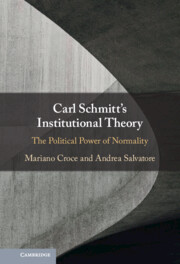Book contents
- Carl Schmitt’s Institutional Theory
- Carl Schmitt’s Institutional Theory
- Copyright page
- Contents
- Acknowledgements
- Introduction
- 1 What Is Exceptionalist Decisionism?
- 2 Looking Backwards
- 3 How Exceptionalist Decisionism Came About
- 4 A Fresh Start
- 5 Out of the Exceptionalist Quagmire
- 6 The Politics of Normality
- 7 Doing Away with Politics
- Conclusion
- References
- Index
4 - A Fresh Start
Schmitt and State Pluralism
Published online by Cambridge University Press: 23 June 2022
- Carl Schmitt’s Institutional Theory
- Carl Schmitt’s Institutional Theory
- Copyright page
- Contents
- Acknowledgements
- Introduction
- 1 What Is Exceptionalist Decisionism?
- 2 Looking Backwards
- 3 How Exceptionalist Decisionism Came About
- 4 A Fresh Start
- 5 Out of the Exceptionalist Quagmire
- 6 The Politics of Normality
- 7 Doing Away with Politics
- Conclusion
- References
- Index
Summary
Chapter 4 juxtaposes two interpretations of The Concept of the Political which seek to clarify a few ambiguities that beset this seminal text: the exceptionalist and the concretist reading. The former reads The Concept of the Political against the background of Political Theology as a key complement to the exceptionalist decisionism of 1922. Conversely, the concretist reading advocated in this chapter teases out Schmitt’s growing interest in the issue of state pluralism and the threat he thought it was posing to the state monopoly on force. On the concretist reading, the state in The Concept of the Political is tasked with guarding against the actualisation of political conflicts, as they could draw the state community to destruction. This implies that, in Schmitt’s political theory, conflict is a condition that the state should strive to avert. State politics is, and should persist as, a pacified condition in which the members of the political community owe their full loyalty and allegiance to the state authority. By interpreting The Concept of the Political as inaugural of a whole new phase in Schmitt’s thinking, the concretist reading provides the ground for a thorough analysis of his institutional theory of the early 1930s.
- Type
- Chapter
- Information
- Carl Schmitt's Institutional TheoryThe Political Power of Normality, pp. 66 - 83Publisher: Cambridge University PressPrint publication year: 2022



